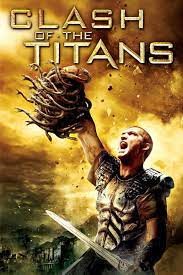
“Release the Kraken!”
During the battle between the Titans and the Gods of Olympus, Hades (Ralph Fiennes) created the Kraken. Hades, Zeus (Liam Neeson), and Poseidon (Danny Huston) divided up the world. Later, Zeus created Mortal Man, whose worship helped maintain the immortality of the gods. But some of the mortals began to lose their faith. King Acrisius (Jason Flemyng) launched an attack against Olympus and was turned into the deformed Calibos. Zeus impregnated his wife as well, and she gave birth to Perseus (Sam Worthington). Enraged, he cast his wife Danae and Perseus upon the waters in a chest. Perseus is found alive by a fisherman named Spyros (Pete Postlethwaite) and his wife Marmara (Elizabeth McGovern).
Eighteen years later, Perseus and his family watch as soldiers from the City of Argos war on the gods. The army is defeated by the Furies and Spyros’ fishing boat is destroyed, killing Perseus’ adopted family. But Perseus survives. He is brought before King Cepheus (Vincent Regan) and Queen Cassiopeia (Polly Walker). Their daughter Andromeda disapproves of the war. The arrogant queen boasts of her daughter’s beauty—greater than Aphrodite’s--and Hades appears. He ages Cassiopeia and threatens to send the Kraken to destroy Argos if Andromeda is not sacrificed. Perseus meets Io (Gemma Arterton), who confirms his divine origin.
Perseus and Io, accompanied by Draco (Mads Mikkelson), Captain of the Royal Guard of Argos, journey to see the Stygian Witches (Ross Mullan, Robin Berry, and Graham Hughes) to force them to help against the Kraken. Zeus tries to give a special sword to Perseus, but he refuses. They are attacked by Calibos on behalf of Hades, and Draco severs Calibos’ hand, whereupon his blood creates giant scorpions. The heroes are rescued by Djinn, who tame the creatures and give them to Perseus and his gang to ride.
The Stygian Witches reveal a weapon against the Kraken—the head of Medusa (Natalia Vodianova). Perseus and his army find Medusa’s temple, but she kills everyone but Perseus and Io until he sees her image reflected in his shield and beheads her. Outside, Calibos stabs Io to death. Perseus kills Calibos with the sword forged in Olympus. The dying Io begs Perseus to save Andromeda and Argos.
He heads for Argos riding the winged horse Pegasus as Hades releases the Kraken. Prokopian (Luke Treadaway) and his fanatic followers, loyal to Hades, take Andromeda to be sacrificed. Perseus arrives just in time and exposes Medusa’s head to the Kraken, which turns to stone and crumbles to dust. Cephius and Prokopian are both crushed beneath the Kraken. Hades confronts Perseus, but in the name of Zeus, Perseus forces Hades back to the Underworld with the sacred sword. He releases Andromeda but refuses to rule Argos with her. Zeus brings Io back to life for him.
The story is based loosely on the original 1981 Ray Harryhausen film, which was loosely based on the Greek Myth. A great deal of the original tale was changed and cannot be relied on as accurate. It was directed by Australian Louis Letterier, following a script written by Travis Beacham, Phil Hay, and Matt Menfredi. It received mostly negative reviews from critics, but spawned a sequel called Wrath of the Titans in 2012. It was nominated for two Golden Raspberries but lost out to Sex and the City 2 and The Last Airbender.
The armor was influenced by that of Masami Kurumada’s Saint Selya Manga. The battle scenes were criticized as hard to follow. The Kraken is a Swedish or Norwegian name and has nothing to do with the Greeks. The winged bulls from the Palace of Sargon II in Assyria, now in the Louvre, appear in the film. The architecture is largely Minoan. Medusa’s hair consisted of 55 CGI snakes. Bubo the owl from the original movie appears despite Sam Worthington threatening to smash it. There are no actual Titans in the movie. The production of the remake concentrates on the adventure and is darker and more realistic than the original. It is indeed an exciting, spectacular adventure with much to enjoy—the giant scorpions, the Kraken itself, the wonderful Medusa, the spectacular scenery and the thrilling music, and the soaring Pegasus, which is black instead of white as always depicted..
But I don’t see much point in comparing movies from two different eras based on the same story—like the 1931 King Kong and Peter Jackson’s 2005 homage to it. One can enjoy both for different reasons. But it seems to me that despite the brilliant and expensive actors and the brilliant and expensive special effects in this version of Clash of the Titans, there is more magic in Ray Harryhausen working all by himself in a back room. The man had the hands of God. If I could only take one of the two movies onto my desert island, I know which one I’d take.
